Unit 2 What time do you go to school? SectionA1a-2d课件+嵌入音频 (共43张PPT)
文档属性
| 名称 | Unit 2 What time do you go to school? SectionA1a-2d课件+嵌入音频 (共43张PPT) |  | |
| 格式 | zip | ||
| 文件大小 | 10.6MB | ||
| 资源类型 | 教案 | ||
| 版本资源 | 人教新目标(Go for it)版 | ||
| 科目 | 英语 | ||
| 更新时间 | 2022-03-01 13:34:11 | ||
图片预览

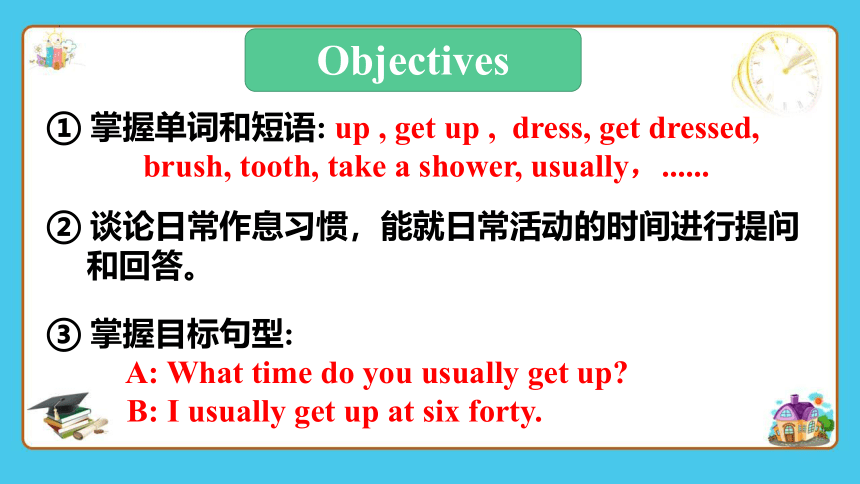
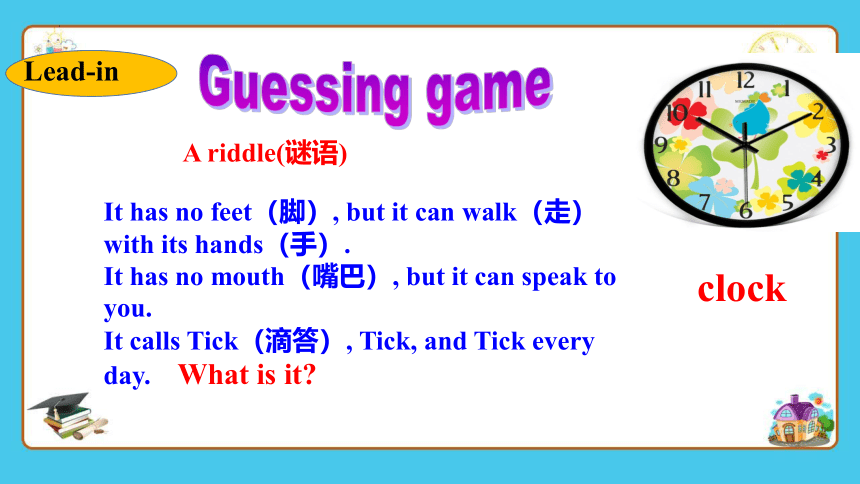
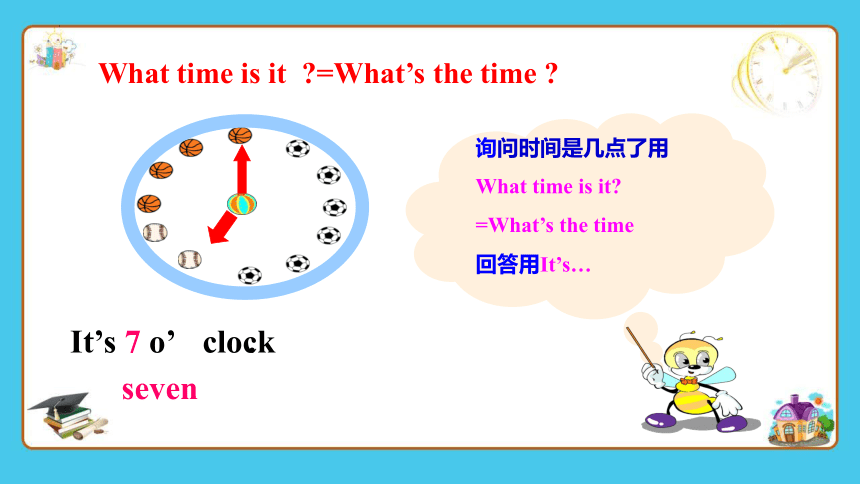
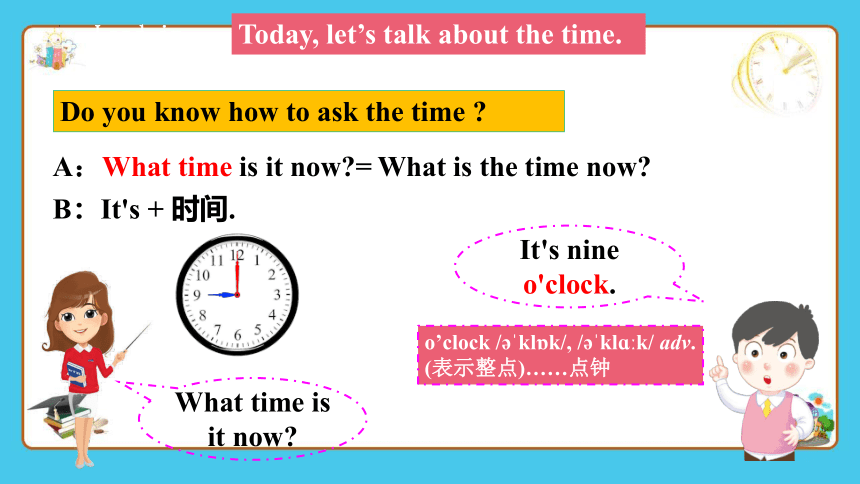
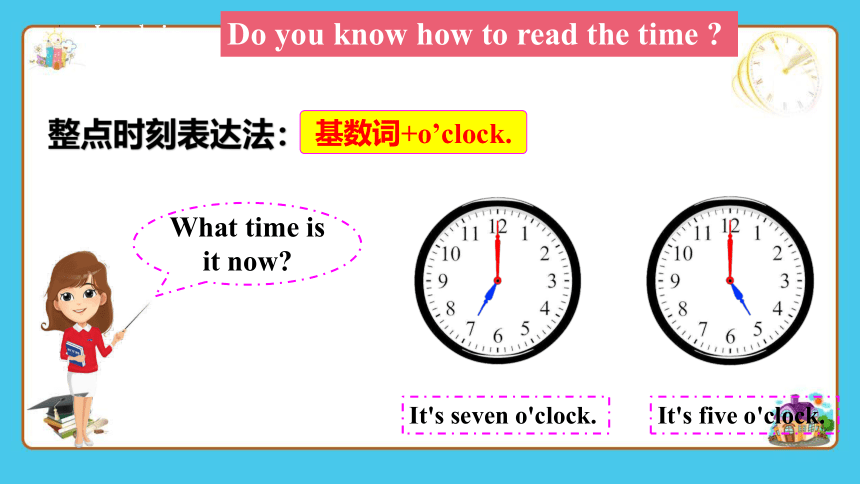

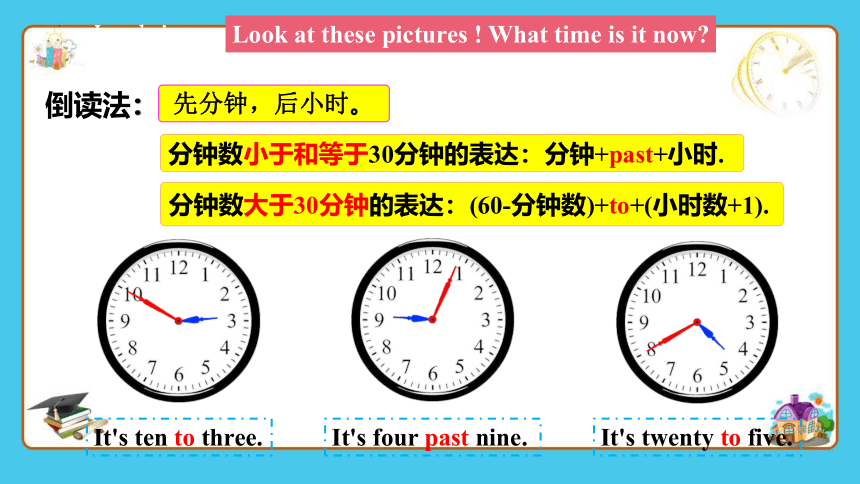
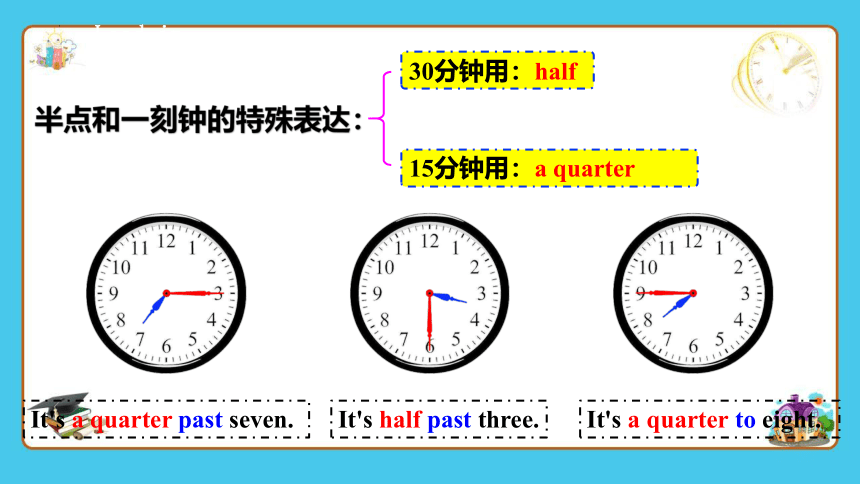
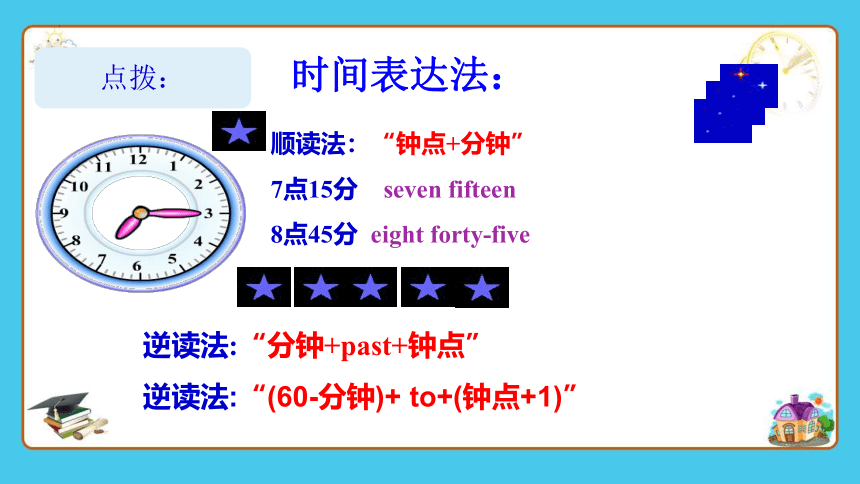
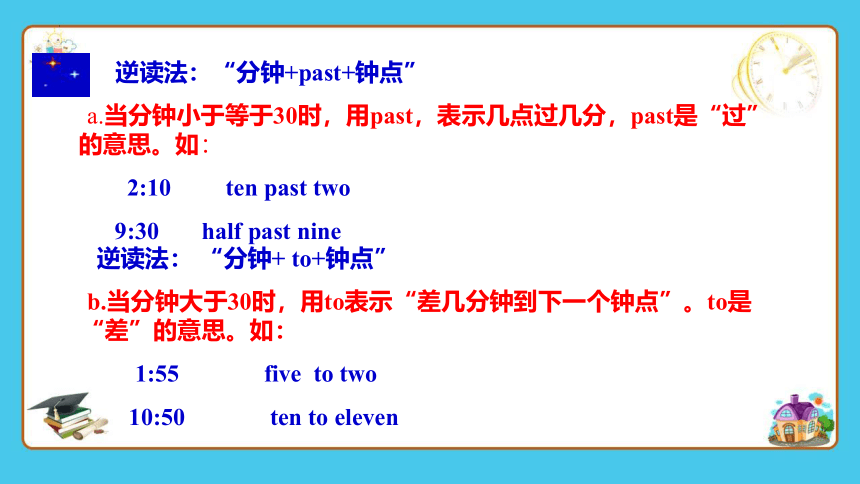

文档简介
(共43张PPT)
人教新目标七年级英语下册
Unit 2
What time do you go to school
Section A
(1a-2d)
① 掌握单词和短语: up , get up , dress, get dressed,
brush, tooth, take a shower, usually,......
② 谈论日常作息习惯,能就日常活动的时间进行提问
和回答。
③ 掌握目标句型:
A: What time do you usually get up
B: I usually get up at six forty.
Objectives
It has no feet(脚), but it can walk(走) with its hands(手).
It has no mouth(嘴巴), but it can speak to you.
It calls Tick(滴答), Tick, and Tick every day. What is it
Guessing game
A riddle(谜语)
clock
Lead-in
It’s 7 o’ .
clock
seven
What time is it =What’s the time
询问时间是几点了用
What time is it
=What’s the time
回答用It’s…
Today, let’s talk about the time.
Do you know how to ask the time
A:What time is it now =
B:It's + 时间.
What is the time now
It's nine o'clock.
What time is it now
o’clock / kl k/, / klɑ k/ adv.
(表示整点)……点钟
Lead in
Do you know how to read the time
整点时刻表达法:
基数词+o’clock.
What time is it now
It's seven o'clock.
It's five o'clock.
Lead in
Lead in
顺读法:
先小时,后分钟,用基数词,按顺序读出。
What time is it now
非整点时刻:分为顺读法和倒读法
It's three twenty-five.
It's five fifty-five.
倒读法:
先分钟,后小时。
Look at these pictures ! What time is it now
分钟数小于和等于30分钟的表达:分钟+past+小时.
分钟数大于30分钟的表达:(60-分钟数)+to+(小时数+1).
It's ten to three.
It's four past nine.
Lead in
It's twenty to five.
Lead in
半点和一刻钟的特殊表达:
30分钟用:half
15分钟用:a quarter
It's a quarter past seven.
It's half past three.
It's a quarter to eight.
时间表达法:
顺读法:“钟点+分钟”
7点15分 seven fifteen
8点45分 eight forty-five
点拨:
逆读法:“分钟+past+钟点”
逆读法:“(60-分钟)+ to+(钟点+1)”
a.当分钟小于等于30时,用past,表示几点过几分,past是“过”的意思。如:
2:10 ten past two
9:30 half past nine
逆读法:“分钟+past+钟点”
逆读法: “分钟+ to+钟点”
b.当分钟大于30时,用to表示“差几分钟到下一个钟点”。to是“差”的意思。如:
1:55 five to two
10:50 ten to eleven
Can you say these activities in English Let’s read them together.
get up
起床
get dressed
穿上衣服
go to school
去上学
brush teeth
刷牙
eat breakfast
吃早饭
take a shower
洗澡
[dres]v.穿衣服 n.连衣裙
[br ]v.刷;刷净 n.刷子
[tu θ]n. ( pl. teeth )牙齿
[ a (r)]n.& v.淋浴 n.淋浴器(间)
1. get up____
2. go to school____
3. get dressed____
4. brush teeth_____
5. eat breakfast____
6. take a shower____
c
d
b
f
e
a
1a
Match the activities with the pictures
1b
Listen and match the time with the actions. Draw lines from the clocks to the pictures.
Tape script
Interviewer: What time do you usually get up, Rick
Rick: Um, I usually get up at six thirty.
Interviewer: And what time do you brush your teeth and take a shower
Rick: I brush my teeth and take a shower at six forty.
Interviewer: Hmm. What time do you eat breakfast
Rick: Seven o’clock.
Interviewer: And what time do you usually get dressed
Rick: I usually get dressed at seven twenty.
Interviewer: And my last question. What time do you go to school
Rick: I usually go to school at seven thirty.
Interviewer: Thank you.
Read aloud the tapescript on P88~89.
Post-listening
Rick usually gets up at six thirty every morning. He 1._______________ and takes a shower at six forty. He eats breakfast 2.________________. He 3.________________ at seven twenty, and then he goes to school 4.________________
________________.
brushes his teeth
at seven o’clock
gets dressed
at half past seven
at seven thirty/
Listen again and fill in the blanks.
What time do/does + sb + (usually) +do?
回答:主语+usually +动词 +at+时间。
询问某人什么时间做什么事:
A: What time do you get up
B: I usually get up at 6:00.
A: What time does he get dressed
B: He usually gets dressed at 6:15.
Student A is the interviewer. Student B is Rick.
Ask and answer questions about Rick’s day.
Activities Time
get up 6:30
brush teeth and take a shower
have breakfast
get dressed
go to school
A: What time do you usually take a shower, Rick
B: I usually take a shower at six forty.
1c
1c Students A is the interviewer. Students B is Rick.
Ask and answer the questions about Rick's day.
I usually take a shower at six forty.
What time do you usually
take a shower, Rick
1c Students A is the interviewer. Students B is Rick.
Ask and answer the questions about Rick's day.
I usually eat breakfast
at seven o'clock.
What time do you usually eat breakfast
1c Students A is the interviewer. Students B is Rick.
Ask and answer the questions about Rick's day.
I usually go to school
at seven thirty.
What time do you usually
go to school
A: What time does he/she… B: He/She…
eat breakfast
take a shower
go to school
7:10
6:45
7:30
Development:
do homework
A: What time does he/she… B: He/She…
go to bed
9:40
6:15
Listen to the conversation and complete the sentences.
Jim has ______brothers
and ________sisters.
Jim’s family has ____
shower.
two
two
one
2a
Listen again. Complete the shower schedule for Jim’s family.
2b
Name Bob Mary Jack Jim Anna
Time 5:30
5:50
6:15
6:30
6:45
Tape script
Read aloud the tapescript on P89.
Interviewer: You have a big family, don’t you, Jim
Jim: Yes, I have two brothers and two sisters.
Interviewer: Wow! How many showers do you have
Jim: We only have one shower.
Interviewer: Is that difficult
Jim: No, because we have a shower schedule. My brother Bob
takes a shower first at five thirty.
Interviewer: Wow! That’s early!
Jim: Yeah. Then my sister Mary takes a shower at five fifty. Next
my brother Jack takes a shower at six fifteen. I take a shower
at six thirty, my sister Anna at six forty-five…
Post-listening
Fill in the blanks according to the conversation in activity 2b.
Jim a big family. He has brothers and two sisters, but they _____ have one shower. Maybe you think it’s for them to take a shower. No, because they have a shower schedule. His brother Bob takes a shower at 5:30.
Then his sister Mary a shower 5:50. Next his brother Jack _______ a shower at 6:15, then his sister Anna 6:45. Now, please guess: What time Jim take a shower
has
two
first
only
difficult
takes
takes
at
does
at
Now talk about yourself.
2c
2c
Talk about your time schedule with classmates .
What time do you usually get up
I always get up at five fifty.
Wow! I never get up so early.
Now follow the example and talk with your partner about schedules.
What time do you usually...
I usually... at...
How about you
...
get up go to school get dressed
brush teeth eat breakfast take a shower
an interesting job
funny
radio show
exercise
radio station
go to work
New words and phrases of 2d
2d
Role-play the conversation.
Interviewer: Scott has an interesting job. He works
at a radio station. Scott, what time is
your radio show
Scott: From twelve o’clock at night to six o’clock
in the morning.
Interviewer: What time do you usually get up
Scott: At eight thirty at night. Then I eat breakfast at nine.
Interviewer: That's a funny time for breakfast!
Scott: Yeah. After that, I usually exercise at
about ten twenty.
Interviewer: When do you go to work
Scott: At eleven o'clock, so I'm never late for
work.
Read the conversation in 2d to complete the chart.
at a radio station
get up
eat breakfast
radio show
at nine
at about ten twenty
at eleven o’clock
at eight thirty at night
from twelve o’clock at night to six o’clock in the morning
2d
go to work
exercise
work
1.What time do you usually get up,Rick 里克,你通常几点起床? (教材第7页)
what time 的用法
本句是“What time+do/does(助动词)+主语+谓语动词+其他?”构成的特殊疑问句。答语不用yes/no回答,而是根据实际情况回答。
——What time do you go to bed 你几点上床睡觉?
——At about nine. 大约九点。
【辨析】 what time 与 when
what time 对时间点提问,答语为“At+时间点”
when 既可以问时间点,也可以问时间段,询问年、月及日期
2.get up 的用法 (教材第7页)
get up 表示“起床”,对应短语: go to bed 上床睡觉
We get up at six in the morning. 我们早上六点钟起床。
【要点拓展】get 的常考短语
3.brush teeth 刷牙 (教材第7页)
brush (one’s)teeth 刷牙,one’s是形容词性物主代词,teeth 是tooth的复数形式。
提示:名词变复数把oo变为ee的词:
foot→feet 脚; tooth→teeth 牙齿。
get up
起床
get to
到达
get on
上车
get off
下车
get back
回来
get down
下来
get together
相聚
get married
结婚
3. Scott has an interesting job. 斯科特有一份有趣的工作。 (教材第8页2d)
job的用法
job作名词,意为“工作;职业”。
Everyone wants to have a good job. 每个人都想有份好工作。
【固定搭配】 out of job 失业 ;Good job. 干得好(用于夸奖某人)
【要点拓展】What’s one’s job 用于对职业的提问,相当于“What does/do+sb.+do / What be+sb. ”
【辨析】 job,work, 与 task
job 可数名词,指具体职业或临时工作
work 不可数名词,泛指“工作,劳动”,指脑力或体力的劳动
task 可数名词,多指他人派给的“工作,任务“,常暗示这种工作的困难的或艰巨的
4.After that, I usually exercise at about ten twenty. 那之后,我通常在大约十点二十锻炼。 (教材第8页2d)
exercise 的用法
exercise 作动词,“运动,锻炼;使......得到锻炼”。
【拓展】exercise 作不可数名词,“锻炼;运动;练习”; 做可数名词,“练习题;体操”
Walking is good exercise. 散步是很好的运动。
He takes exercise every day. 他每天都运动。
We do morning exercise every day. 我们每天做早操。
exercise 相关的短语:
do morning/eye exercise
做早操/眼保健操
take more exercise
多锻炼
do/take exercise=do sports
进行运动;锻炼身体
do some English exercises
做一些英语习题
5.At eleven o’clock,so I’m never late for work. 在十一点钟,所以我上班从来没有迟到过。 (教材第8页2d)
be late for 的用法
意思是“迟到”, be随主语变化而变化。be late for相当于arrive late for。
Tom is never late for class. 汤姆上课从来不迟到。
late 的用法
late 在此句中做形容词,意为“迟到”,be late for 后常接名词、代词或动词-ing形式。 此短语后常接work,class,school,bus 等名词。
I’m late for the concert. 我参加演唱会迟到了。
at night, be late for, early, at six forty, funny, get up
1. Alice usually _______ at 6:30 in the morning.
2. His uncle works from 10:00 _________ to 6:00 in the morning.
3. His brother never goes to school so _____.
4. The lazy boy __ always _______ school.
5. My sister always takes a shower __________.
6. Look at that boy. He’s really _____.
选词填空
funny
at six forty
is late for
early
gets up
at night
Practice
1.-- Do you want to find_______in the school
-- Yes, I do. I'm good with students.
A.a work B. a job
C. job D. works
2. --When do you go to school
-- I go to school____Monday____Friday.
A. on; to B. from; to
C. in; and D. in; to
3.-- Do you_______ in the morning
-- Yes. I usually run with my brother.
A.eat B.exercise C.draw D.write
4. --_______does Tom usually have breakfast
--At about 7:00.
A.What time B.What day C.Where D.How
Homework
1. Recite the new words and phrases.
2. Write your time schedule.
Homework
人教新目标七年级英语下册
Unit 2
What time do you go to school
Section A
(1a-2d)
① 掌握单词和短语: up , get up , dress, get dressed,
brush, tooth, take a shower, usually,......
② 谈论日常作息习惯,能就日常活动的时间进行提问
和回答。
③ 掌握目标句型:
A: What time do you usually get up
B: I usually get up at six forty.
Objectives
It has no feet(脚), but it can walk(走) with its hands(手).
It has no mouth(嘴巴), but it can speak to you.
It calls Tick(滴答), Tick, and Tick every day. What is it
Guessing game
A riddle(谜语)
clock
Lead-in
It’s 7 o’ .
clock
seven
What time is it =What’s the time
询问时间是几点了用
What time is it
=What’s the time
回答用It’s…
Today, let’s talk about the time.
Do you know how to ask the time
A:What time is it now =
B:It's + 时间.
What is the time now
It's nine o'clock.
What time is it now
o’clock / kl k/, / klɑ k/ adv.
(表示整点)……点钟
Lead in
Do you know how to read the time
整点时刻表达法:
基数词+o’clock.
What time is it now
It's seven o'clock.
It's five o'clock.
Lead in
Lead in
顺读法:
先小时,后分钟,用基数词,按顺序读出。
What time is it now
非整点时刻:分为顺读法和倒读法
It's three twenty-five.
It's five fifty-five.
倒读法:
先分钟,后小时。
Look at these pictures ! What time is it now
分钟数小于和等于30分钟的表达:分钟+past+小时.
分钟数大于30分钟的表达:(60-分钟数)+to+(小时数+1).
It's ten to three.
It's four past nine.
Lead in
It's twenty to five.
Lead in
半点和一刻钟的特殊表达:
30分钟用:half
15分钟用:a quarter
It's a quarter past seven.
It's half past three.
It's a quarter to eight.
时间表达法:
顺读法:“钟点+分钟”
7点15分 seven fifteen
8点45分 eight forty-five
点拨:
逆读法:“分钟+past+钟点”
逆读法:“(60-分钟)+ to+(钟点+1)”
a.当分钟小于等于30时,用past,表示几点过几分,past是“过”的意思。如:
2:10 ten past two
9:30 half past nine
逆读法:“分钟+past+钟点”
逆读法: “分钟+ to+钟点”
b.当分钟大于30时,用to表示“差几分钟到下一个钟点”。to是“差”的意思。如:
1:55 five to two
10:50 ten to eleven
Can you say these activities in English Let’s read them together.
get up
起床
get dressed
穿上衣服
go to school
去上学
brush teeth
刷牙
eat breakfast
吃早饭
take a shower
洗澡
[dres]v.穿衣服 n.连衣裙
[br ]v.刷;刷净 n.刷子
[tu θ]n. ( pl. teeth )牙齿
[ a (r)]n.& v.淋浴 n.淋浴器(间)
1. get up____
2. go to school____
3. get dressed____
4. brush teeth_____
5. eat breakfast____
6. take a shower____
c
d
b
f
e
a
1a
Match the activities with the pictures
1b
Listen and match the time with the actions. Draw lines from the clocks to the pictures.
Tape script
Interviewer: What time do you usually get up, Rick
Rick: Um, I usually get up at six thirty.
Interviewer: And what time do you brush your teeth and take a shower
Rick: I brush my teeth and take a shower at six forty.
Interviewer: Hmm. What time do you eat breakfast
Rick: Seven o’clock.
Interviewer: And what time do you usually get dressed
Rick: I usually get dressed at seven twenty.
Interviewer: And my last question. What time do you go to school
Rick: I usually go to school at seven thirty.
Interviewer: Thank you.
Read aloud the tapescript on P88~89.
Post-listening
Rick usually gets up at six thirty every morning. He 1._______________ and takes a shower at six forty. He eats breakfast 2.________________. He 3.________________ at seven twenty, and then he goes to school 4.________________
________________.
brushes his teeth
at seven o’clock
gets dressed
at half past seven
at seven thirty/
Listen again and fill in the blanks.
What time do/does + sb + (usually) +do?
回答:主语+usually +动词 +at+时间。
询问某人什么时间做什么事:
A: What time do you get up
B: I usually get up at 6:00.
A: What time does he get dressed
B: He usually gets dressed at 6:15.
Student A is the interviewer. Student B is Rick.
Ask and answer questions about Rick’s day.
Activities Time
get up 6:30
brush teeth and take a shower
have breakfast
get dressed
go to school
A: What time do you usually take a shower, Rick
B: I usually take a shower at six forty.
1c
1c Students A is the interviewer. Students B is Rick.
Ask and answer the questions about Rick's day.
I usually take a shower at six forty.
What time do you usually
take a shower, Rick
1c Students A is the interviewer. Students B is Rick.
Ask and answer the questions about Rick's day.
I usually eat breakfast
at seven o'clock.
What time do you usually eat breakfast
1c Students A is the interviewer. Students B is Rick.
Ask and answer the questions about Rick's day.
I usually go to school
at seven thirty.
What time do you usually
go to school
A: What time does he/she… B: He/She…
eat breakfast
take a shower
go to school
7:10
6:45
7:30
Development:
do homework
A: What time does he/she… B: He/She…
go to bed
9:40
6:15
Listen to the conversation and complete the sentences.
Jim has ______brothers
and ________sisters.
Jim’s family has ____
shower.
two
two
one
2a
Listen again. Complete the shower schedule for Jim’s family.
2b
Name Bob Mary Jack Jim Anna
Time 5:30
5:50
6:15
6:30
6:45
Tape script
Read aloud the tapescript on P89.
Interviewer: You have a big family, don’t you, Jim
Jim: Yes, I have two brothers and two sisters.
Interviewer: Wow! How many showers do you have
Jim: We only have one shower.
Interviewer: Is that difficult
Jim: No, because we have a shower schedule. My brother Bob
takes a shower first at five thirty.
Interviewer: Wow! That’s early!
Jim: Yeah. Then my sister Mary takes a shower at five fifty. Next
my brother Jack takes a shower at six fifteen. I take a shower
at six thirty, my sister Anna at six forty-five…
Post-listening
Fill in the blanks according to the conversation in activity 2b.
Jim a big family. He has brothers and two sisters, but they _____ have one shower. Maybe you think it’s for them to take a shower. No, because they have a shower schedule. His brother Bob takes a shower at 5:30.
Then his sister Mary a shower 5:50. Next his brother Jack _______ a shower at 6:15, then his sister Anna 6:45. Now, please guess: What time Jim take a shower
has
two
first
only
difficult
takes
takes
at
does
at
Now talk about yourself.
2c
2c
Talk about your time schedule with classmates .
What time do you usually get up
I always get up at five fifty.
Wow! I never get up so early.
Now follow the example and talk with your partner about schedules.
What time do you usually...
I usually... at...
How about you
...
get up go to school get dressed
brush teeth eat breakfast take a shower
an interesting job
funny
radio show
exercise
radio station
go to work
New words and phrases of 2d
2d
Role-play the conversation.
Interviewer: Scott has an interesting job. He works
at a radio station. Scott, what time is
your radio show
Scott: From twelve o’clock at night to six o’clock
in the morning.
Interviewer: What time do you usually get up
Scott: At eight thirty at night. Then I eat breakfast at nine.
Interviewer: That's a funny time for breakfast!
Scott: Yeah. After that, I usually exercise at
about ten twenty.
Interviewer: When do you go to work
Scott: At eleven o'clock, so I'm never late for
work.
Read the conversation in 2d to complete the chart.
at a radio station
get up
eat breakfast
radio show
at nine
at about ten twenty
at eleven o’clock
at eight thirty at night
from twelve o’clock at night to six o’clock in the morning
2d
go to work
exercise
work
1.What time do you usually get up,Rick 里克,你通常几点起床? (教材第7页)
what time 的用法
本句是“What time+do/does(助动词)+主语+谓语动词+其他?”构成的特殊疑问句。答语不用yes/no回答,而是根据实际情况回答。
——What time do you go to bed 你几点上床睡觉?
——At about nine. 大约九点。
【辨析】 what time 与 when
what time 对时间点提问,答语为“At+时间点”
when 既可以问时间点,也可以问时间段,询问年、月及日期
2.get up 的用法 (教材第7页)
get up 表示“起床”,对应短语: go to bed 上床睡觉
We get up at six in the morning. 我们早上六点钟起床。
【要点拓展】get 的常考短语
3.brush teeth 刷牙 (教材第7页)
brush (one’s)teeth 刷牙,one’s是形容词性物主代词,teeth 是tooth的复数形式。
提示:名词变复数把oo变为ee的词:
foot→feet 脚; tooth→teeth 牙齿。
get up
起床
get to
到达
get on
上车
get off
下车
get back
回来
get down
下来
get together
相聚
get married
结婚
3. Scott has an interesting job. 斯科特有一份有趣的工作。 (教材第8页2d)
job的用法
job作名词,意为“工作;职业”。
Everyone wants to have a good job. 每个人都想有份好工作。
【固定搭配】 out of job 失业 ;Good job. 干得好(用于夸奖某人)
【要点拓展】What’s one’s job 用于对职业的提问,相当于“What does/do+sb.+do / What be+sb. ”
【辨析】 job,work, 与 task
job 可数名词,指具体职业或临时工作
work 不可数名词,泛指“工作,劳动”,指脑力或体力的劳动
task 可数名词,多指他人派给的“工作,任务“,常暗示这种工作的困难的或艰巨的
4.After that, I usually exercise at about ten twenty. 那之后,我通常在大约十点二十锻炼。 (教材第8页2d)
exercise 的用法
exercise 作动词,“运动,锻炼;使......得到锻炼”。
【拓展】exercise 作不可数名词,“锻炼;运动;练习”; 做可数名词,“练习题;体操”
Walking is good exercise. 散步是很好的运动。
He takes exercise every day. 他每天都运动。
We do morning exercise every day. 我们每天做早操。
exercise 相关的短语:
do morning/eye exercise
做早操/眼保健操
take more exercise
多锻炼
do/take exercise=do sports
进行运动;锻炼身体
do some English exercises
做一些英语习题
5.At eleven o’clock,so I’m never late for work. 在十一点钟,所以我上班从来没有迟到过。 (教材第8页2d)
be late for 的用法
意思是“迟到”, be随主语变化而变化。be late for相当于arrive late for。
Tom is never late for class. 汤姆上课从来不迟到。
late 的用法
late 在此句中做形容词,意为“迟到”,be late for 后常接名词、代词或动词-ing形式。 此短语后常接work,class,school,bus 等名词。
I’m late for the concert. 我参加演唱会迟到了。
at night, be late for, early, at six forty, funny, get up
1. Alice usually _______ at 6:30 in the morning.
2. His uncle works from 10:00 _________ to 6:00 in the morning.
3. His brother never goes to school so _____.
4. The lazy boy __ always _______ school.
5. My sister always takes a shower __________.
6. Look at that boy. He’s really _____.
选词填空
funny
at six forty
is late for
early
gets up
at night
Practice
1.-- Do you want to find_______in the school
-- Yes, I do. I'm good with students.
A.a work B. a job
C. job D. works
2. --When do you go to school
-- I go to school____Monday____Friday.
A. on; to B. from; to
C. in; and D. in; to
3.-- Do you_______ in the morning
-- Yes. I usually run with my brother.
A.eat B.exercise C.draw D.write
4. --_______does Tom usually have breakfast
--At about 7:00.
A.What time B.What day C.Where D.How
Homework
1. Recite the new words and phrases.
2. Write your time schedule.
Homework
同课章节目录
- Unit 1 Can you play the guitar?
- Section A
- Section B
- Unit 2 What time do you go to school?
- Section A
- Section B
- Unit 3 How do you get to school?
- Section A
- Section B
- Unit 4 Don't eat in class.
- Section A
- Section B
- Unit 5 Why do you like pandas?
- Section A
- Section B
- Unit 6 I'm watching TV.
- Section A
- Section B
- Review of Units 1-6
- Unit 7 It's raining!
- Section A
- Section B
- Unit 8 Is there a post office near here?
- Section A
- Section B
- Unit 9 What does he look like?
- Section A
- Section B
- Unit 10 I'd like some noodles.
- Section A
- Section B
- Unit 11 How was your school trip?
- Section A
- Section B
- Unit 12 What did you do last weekend?
- Section A
- Section B
